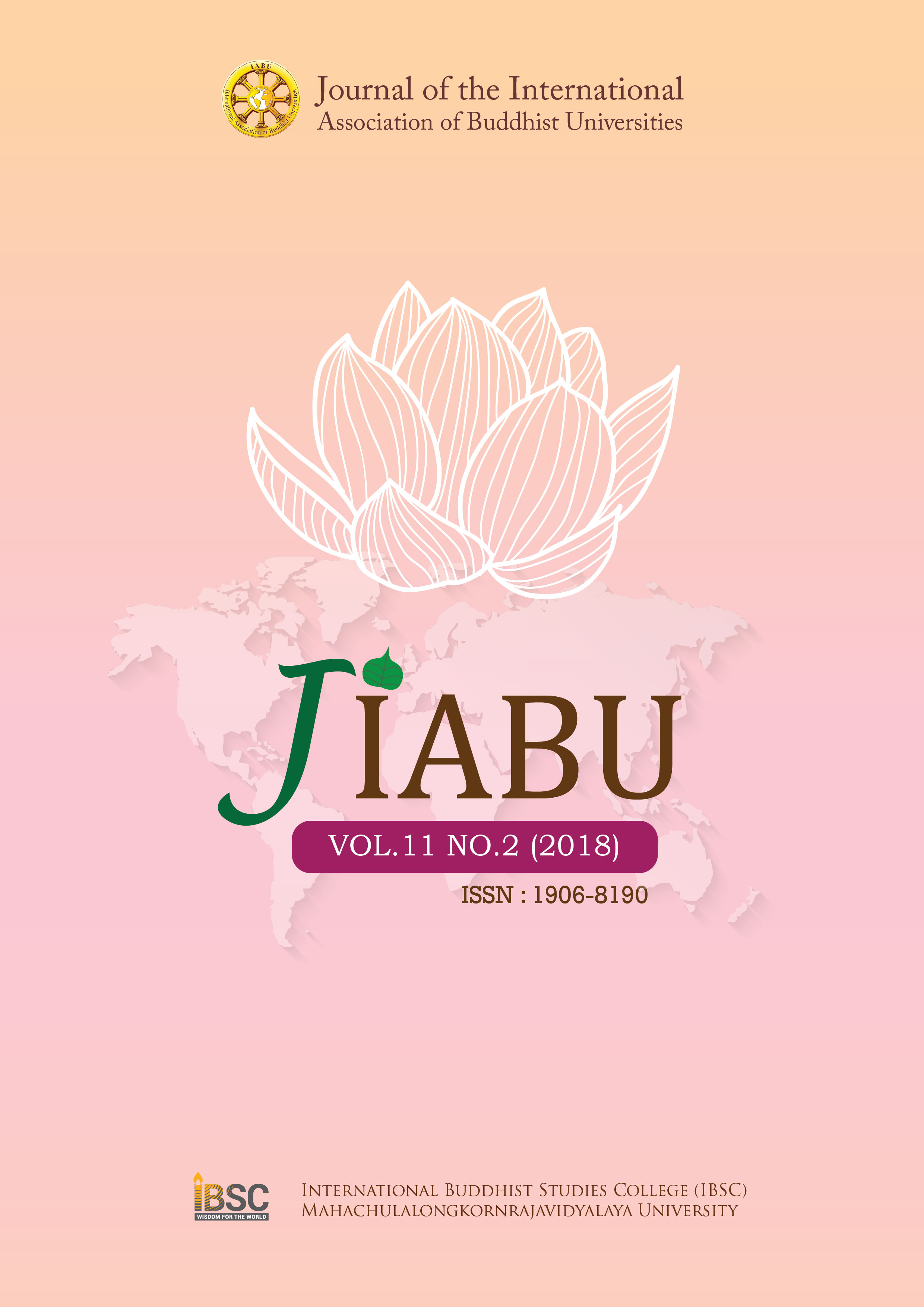A Study of Vicikicchā in Theravāda Buddhism
Main Article Content
Abstract
This research article is about a study of Vicikicchā in Theravāda Buddhism.
Specifi cally, it was to study Vicikicchā as a factor of five Hindrances and a method for
overcoming them systematically. It was for achieving knowledge and understanding about
Vicikicchā and clear up some doubts about the subject.
This study focuses on skepticism about Vicikicchā on eight topics: the Buddha, the
teaching of Dhamma, the society of Sangha, the training, the past, the future, the past, and the
future, and the law of dependent origination. The objects of doubt can be the Triple Gems
(Buddha, Dhamma, and Saṁgha), the discipline, Kamma, or the law of dependent origination.
All involve the Buddha’s methods of liberation. Factors of Vicikicchā are an unanalytical reflection
(Ayonisomanasikāra), ignorance (Avijja), and false view on the Dhamma (Micchādiṭṭhi). These
factors make people uncertain about following the Buddha’s teaching, that is, Vicikicchā are
the obstacles to Enlightenment.
General doubts can cause problems to a person both at the spiritual level and at a
physical level. In society they can lead people to suspect each other and try to break off
relationships with other people. It can be considered that Vicikicchā is unwholesome doubts,
which are different from philosophical doubts. Philosophical doubts concern the search for
knowledge or theory. A primary cause of Vicikicchā is the opportunity to own self. If
you want peace in your life it is important to try to live without doubts among friends and
relations. A stream-enterer can have general doubts but cannot have Vicikicchā anymore.
When beings reach the final emancipation by getting to be an Arahanta they will have no
doubts like Vicikicchā at all.
Article Details
Views and opinions expressed in the articles published by The Journal of the International Association of Buddhist Universities (JIABU), are of responsibility by such authors but not the editors and do not necessarily reflect those of the editors.
References
Society, 2004.
Bodhi, Bhikkhu, (trs.), The Connected Discourses of the Buddha (Samyutta Nikaya), Boston:
Wisdom Publication, 2000.
Bodhi, Bhikkhu, (trs.), The Numerical Discourses of the Buddha (Anguttara Nikaya), Boston:
Wisdom Publication, 2012.
Buddhaghosa, Visuddhimagga: The Path of Purifi cation, Nanamoli, Bhikkhu, (trs), Seattle:
WA: BPS Pariyatti Editions, 1999.
Buddharakkhita, Acharya, History of Pali Language and Literature, Bangalore: Sreeranga
Printers Pvt Ltd, 2005.
Buddhaghosa, The Expositor (Atthasalini): translated by Pe Maung Tin, and edited by Caroline
A. F., & Rhys Davids, London: Pali Text Society, 1921.
Buddharakkhita, Acharya, Sutta Sangaho: Selected Discourses of the Buddha, New Delhi:
Buddha Vachana Trust, 2003.
Buddhadatta, A. P., Mahāthera, Concise Pāli-English Dictionary, Motilal Banarsidass
Publisher, 1957.
Buddharakkhita, Acharya, History of Pali Language and Literature, Bangalore: Sreeranga
Printers Pvt Ltd, 2005.
Bhikkhu, Pasanno, Bhikkhu, Amaro, The Island: An Anthology of Buddha’s Teachings on
Nibbana, Penang: An Abhayagiri Publication, 2010.
Dhammapala, Paramattha-dipani: Vimanavatthu-atthakatha, translated by Peter Masefi eld;
assisted by N.A. Jayawickrama, Oxford: The Pali Text Society, 2015.
Dhammapala, Paramattha-dipani: Vimanavatthu-atthakatha, translatedby Peter Masefield;
assisted by N.A. Jayawickrama, Oxford, The Pali Text Society, 2015.
Hote Sein, U, Pāli-Myanmar Dictionary, Yangon: Pitaka Byuhar Association, 1985.
Henepola Gunaralana, A Critical Analysis of the Jhānas in TheravādaBuddhist Mediation,
Washington: the American University, 1980.
Hare, E. M (trs.), The Books of the Gradual Sayings (anguttara-nikāya), Vol. III, London:
Pali Text Society, 1973.
Hare, E. M., (trs.), The Books of the Gradual Sayings (Anguttara Nikaya), Vol. III, London:
Pali Text Society, 1973.
Janakābhivaṁsa, Ashin, Thingyobharthartika, Yangon: New Burma Press, 2014.
Ko Lay, U (trs), Abhidhamma in Daily Life, Taiwan: The Corporate Body of the Buddha
Educational Foundation, 2009.
Mon, Mehm Tin, The Essence of Buddha Abhidhamma, Yangon: Mehm Tay Zar Mon,
1995.
Morris, R., (Ed), A., K., Wader (revised), Anguttara Nikaya. Vols. I-II. Oxford: PTS, 1989,
1995.
Maurice, Walshe, (trs.) The Long Length Discourses of the Buddha (Digha Nikaya),
Massachusetts: Wisdom Publications, 1987.
Nanamoli, Bhikkhu, (trs.), The Middle Length Discourses of the Buddha (Majjhima Nikaya),
Boston: Wisdom Publication, 2005.
Nārada, Venerable Mahāthera, The Buddha and His Teachings, Taipei: Buddha Educational
Foundation, 1998, p. 229.
Nyanatiloka, Ven., Buddhist Dictionary: Manual of Buddhist Terms and Doctrine, Kandy:
Buddhist Publication Society, 1988.
Nyanatiloka, Ven., Buddhist Dictionary: Manual of Buddhist Terms and Doctrine, Kandy:
Buddhist Publication Society, 1988, p. 289.
Nanamoli, Bhikkhu, (trs.), The Path of Purification: Visuddhimagga, Kandy: Buddhist
Publication Society, 1997.
Piya, Tan, Sutta Discovery (SD), Vol. 31.8- “Vicikicchā: Doubt”, Singapore: Minding Center.
2010.


